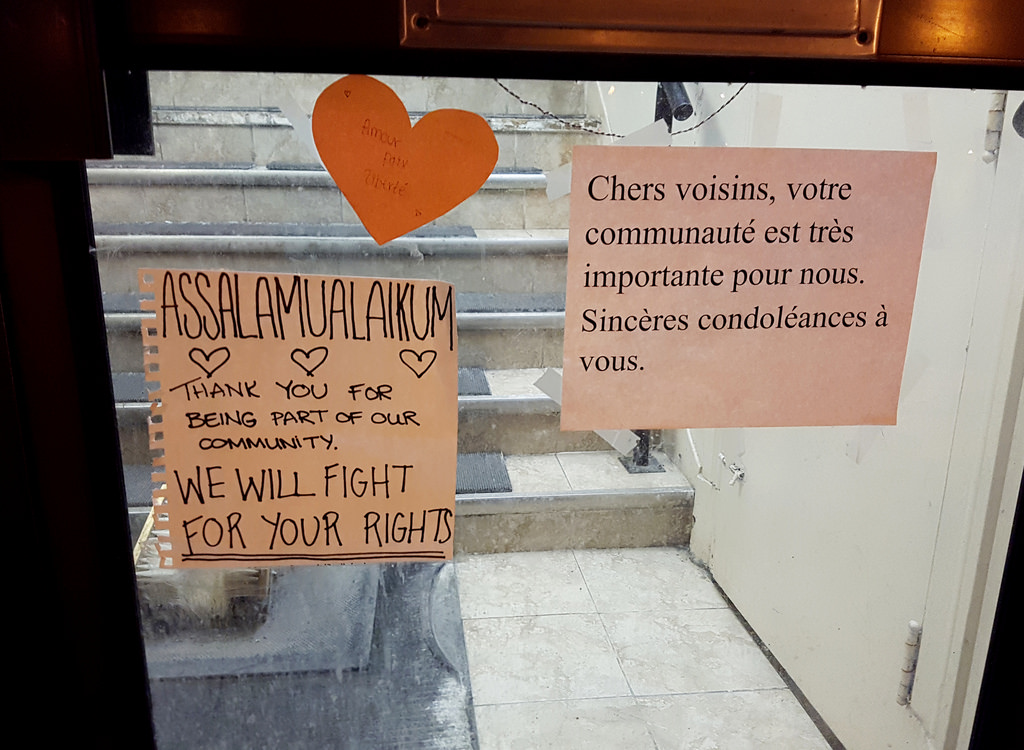January 29 marks the second anniversary of the Quebec City massacre, when a young man by the name of Alexandre Bissonnette walked into a mosque during evening prayers and started shooting worshippers at random. He killed six and injured 19.
The day before this grim anniversary, a 16-year-old was arraigned in a court in Kingston, Ont., on charges related to terrorism.
Although no violent acts were committed in the second case, in many ways the media, the criminal justice system and politicians treated the Kingston youth as a greater danger to public safety than the mosque shooter.
Prior to the mosque shooting, Bissonnette had frequently expressed violent, far-right, racist and xenophobic views on social media, yet he was not, as far as we can tell, on the radar of any security service — be it the Sûreté du Québec, CSIS or the RCMP.
When authorities charged Bissonnette, it was only with murder and attempted murder, not with any terrorism-related offences. They made that choice notwithstanding the fact that the killer had stated quite clearly his motive for terrorizing a peaceful group of people at prayer was his burning hatred for Muslims.
To invoke terrorism in such a case, the authorities explained, there would have had to be evidence of collaboration with some sort of organized terrorist group. There was no such evidence in Bissonnette’s case.
Two years later, in a Kingston court, the crown arraigned the 16-year-old youth for facilitating a terrorist activity, as defined by section 83.19 of the Canadian Criminal Code.
There are very few known facts in the Kingston case, because the accused is a minor whose identity cannot be divulged. Lawyer and anti-terrorism expert Leah West analyzed the little we do know for CBC Radio’s The House.
West noted that the criminal code section under which the youth was charged makes no reference to terrorist organizations. That is significant, she explained, because the crown chose not to charge the youth under another section, 83.2, which does specify activities for the purposes of aiding a terrorist group. Remember that in Bissonnette’s case prosecutors elected not to impose terrorism charges precisely because they said the killer was not affiliated with any group.
Based on what we know, it would be reasonable to surmise that the 16-year-old in Kingston had likely acted alone, or virtually alone, not as part of an organized conspiracy.
It is a fact that police services sometimes use elaborate schemes and undercover operators to entrap people. Not too long ago, the courts in British Columbia dismissed a case against two marginalized people whom the police had lured into taking part in a goofy scheme to bomb the legislature.
It is also a fact that a variety of police and security forces expended enormous efforts on the Kingston case.
And in contrast to the Bissonnette case, spokespeople for those security forces have not been reluctant to characterize the Kingston case as an open-and-shut matter of terrorism, with significant implications for national security, to boot.
Indeed, authorities have said there are international security implications in this case. The original tip-off came, they say, from the American FBI.
Some politicians could not resist an opportunity for partisan attacks
Two years ago, politicians were circumspect, non-partisan and solemn in their reaction to the horrific crimes of Bissonnette.
In the case of the Kingston youth, however, at least some political figures have been quick to use it for partisan advantage.
Conservative leader Andrew Scheer did not even wait for the arraignment before suggesting the accusations against one 16-year-old prove that Canada must re-examine its refugee screening system.
Of course, we do not know anything about the identity or origins of the accused youth, except that he, apparently, speaks Arabic. That did not stop Scheer from exploiting the situation as a cudgel with which to beat the notionally too-soft-on-refugees Trudeau government.
When an old-stock English- or French-speaking Canadian commits a crime, however brutal and bloody, we tend to see it as a crime and nothing more. In our collective eyes, the only guilty person is the perpetrator himself. His guilt does not extend to any group or community; nor does it pose a threat to the peace and order of society at large.
We react that way even when, as in the Bissonnette case, the criminal himself loudly and proudly proclaims his fiercely ideological motives.
The story is quite different when the accused person is someone who is, possibly, a recent arrival to Canada.
In the Kingston case, we are dealing, at this point, with a vague and ill-defined criminal act. Whatever crime the accused might have been planning, he never consummated it. There was no act of violence. Nobody was injured, let alone killed. And yet, this case has engendered a national panic attack, complete with lurid headlines and breathless media reports.
The phrase innocent until proven guilty is a cliché, but it does have a real meaning.
Politicians, the police and those of us in the media would be well advised to remember that phrase, and hew to it scrupulously, when talking about the accusations against this 16-year-old resident of Kingston.
Photo: Coastal Elite/Flickr
Karl Nerenberg has been a journalist and filmmaker for more than 25 years. He is rabble’s politics reporter.
Help make rabble sustainable. Please consider supporting our work with a monthly donation. Support rabble.ca today for as little as $1 per month!



